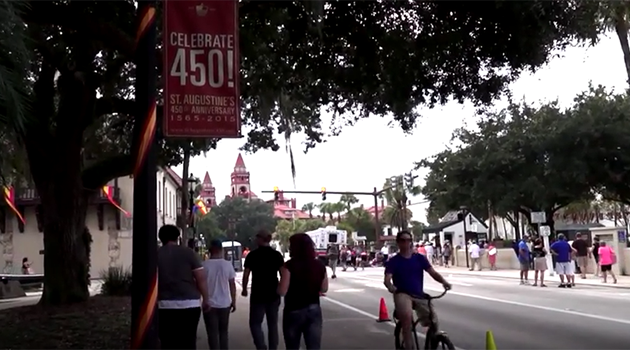Video by Will Sandman & Jamie Coulson
By Will Sandman | gargoyle@flagler.edu
It’s a sunny afternoon during the recent 450th anniversary celebration of the founding of St. Augustine, no clouds in sight and a light breeze is coming off the Intracoastal Waterway. A women clears her throat and the interrogation begins. As she begins to ask questions that are beyond the ordinary realms of human comprehension, heart rates pick up, palms get sweaty and words start tumbling out of mouths.
“What year was St. Augustine founded?” she asks.
Desperate eyes start looking everywhere for answers, mental calculators begin turning and finally an answer comes out. “1876?” Immediately the reporter’s face turns into a grin and the embarrassment sets in.
Everywhere there are signs and banners declaring a single year, 1565.
According to an article by nationaljournal.com’s Marina Koren, 55 percent of Americans think that they are smarter than the average American. Yet from one day of asking residents of St. Augustine and tourists alike, it is abundantly apparent that the “average American” may not be very smart at all.
While some people may be forgiven for not knowing a date (we are, after all, in an age when knowing dates is becoming outdated) the other answers are less pardonable.
As an American it should be your duty to know that George Washington was neither European, nor alive during the 16th century (I’m looking at you, man in the white shirt). Yet, there were some promising answers, and intriguing results.
According to our survey, which encompassed over 20 attendants of St. Augustine’s celebration, about twice as many people thought that Ponce de Leon founded St. Augustine. While he was certainly an important figure in Saint Augustine’s history, Pedro Menendez, the actual founder, got little to no support. Oh, and apparently Native Americans are now European.
According to Dr. Michael Butler, a history professor at Flagler College, St. Augustine repeated many of the same mistakes made at the 400th celebration of the city’s founding, something he finds ironic. “They haven’t learned from the past,” he said. “The same protests we saw 50 years ago easily could have been made now.”




Be the first to comment on "Oldest City needs to brush up on historical knowledge"